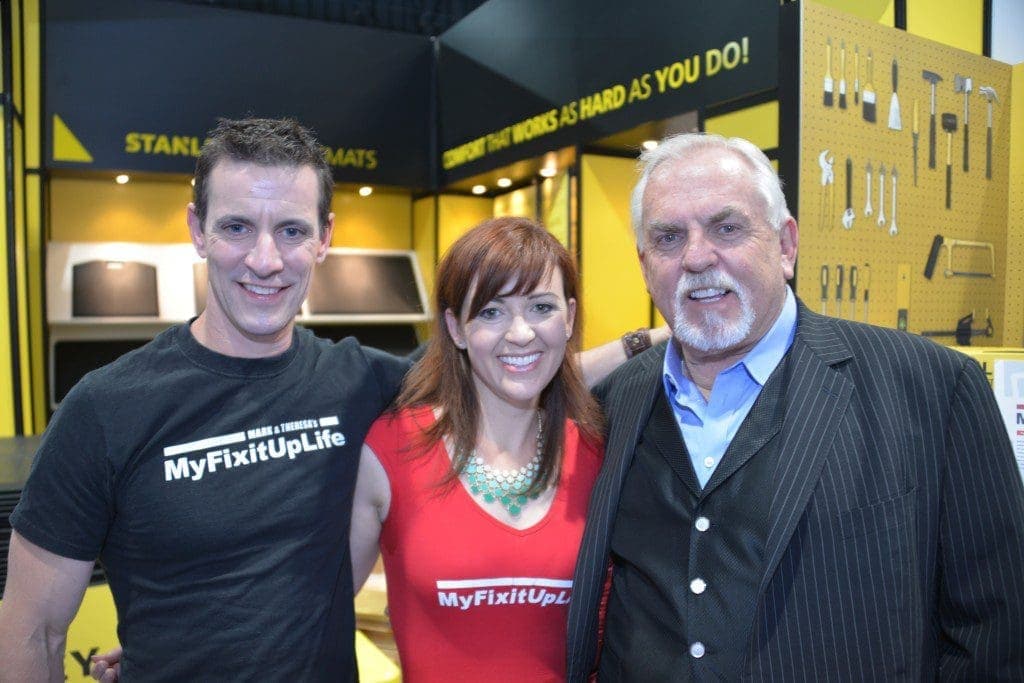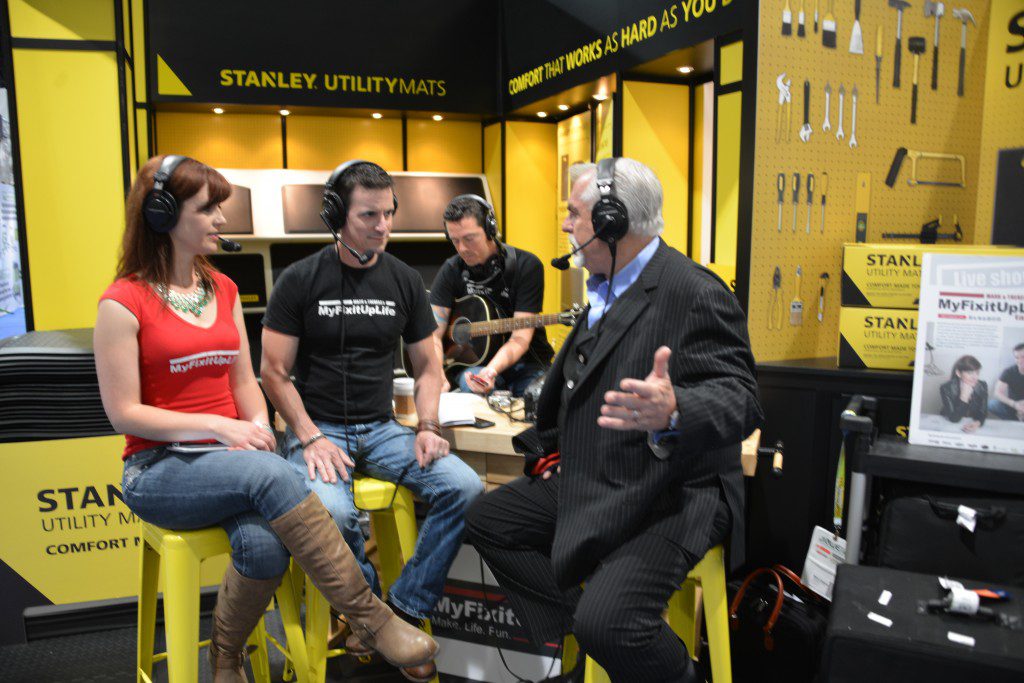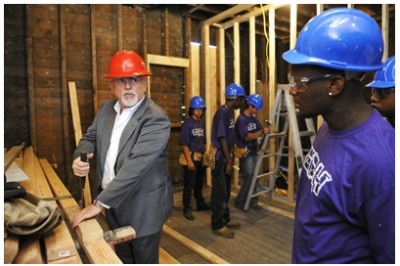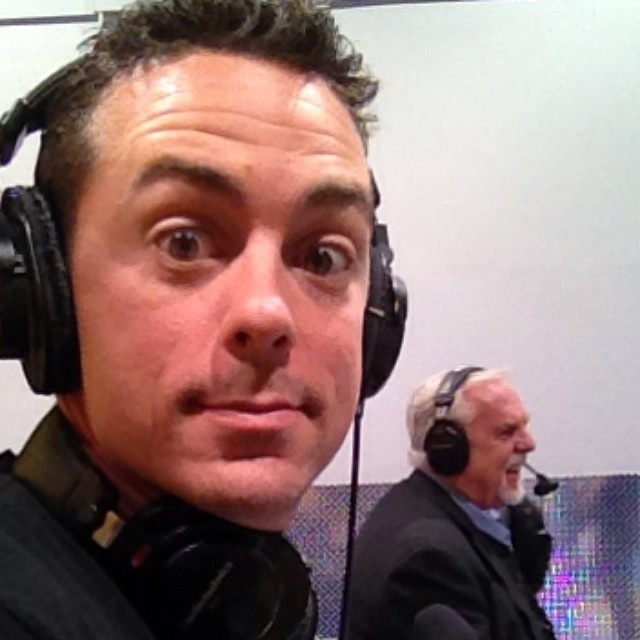
Famous actor John Ratzenberger talks about being a house framer, his made in America passion, teaching kids basic DIY skills and what his life was like before he became an actor with a famous voice during this MyFixitUpLife interview.
Mark: You’re inside MyFixitUpLife and the tachometer is red lined.
Theresa: Red lined?
Mark: Red lined.
Theresa: All right.
Mark: Bruce Springsteen fires me up.
Theresa: Yes. I’m glad he fires you up. That’s positive.
Mark: We’re at the Stanley Utility Mat booth at the National Hardware Show.
Theresa: We are.
Mark: We’re joined by a voice certainly that you know, a face that you know and a mission that you may not know.
Theresa: Okay, that you should know about.
Mark: John Ratzenberger.
Made in America
John: Older people, your uncles, aunts, mother and father know about my mission. It’s keeping things Made in America because people don’t realize that that’s the real strength of America. It’s not actors or sports celebrities, it’s the fact that we make stuff and that’s what brought us to the dance if you will. Western Civilization, that’s the strength of America.
Manufacturing is to America what spinach is to Popeye. If we don’t have manufacturing here, we become a third world country. If you’ve ever been to a third world country, that’s us in about 12 years if we don’t stop chasing manufacturers overseas.
Theresa: We’re very passionate about Made in America. We were just talking to Mark from the Made in America store.
John: Oh yeah, good guy. He’s a hero.
Theresa: All of the details that are involved in trying to figure out, making sure every single and part of things, not only that they’re made here with American hands and made in an American facility, but all of those things, the supplies that you get, it’s mindboggling to me to be able to get that all distilled down into something like the Made in America store which does it for us.
Why Made in America is important
John: Right. Also, the school system in the last 30 years has made it stupid because people somehow…I always wondered about when will people understand that when you buy let’s say a t-shirt that’s made let’s say in China and you think it’s $3 cheaper, wow, okay, I can get a big deal on this. Well, somewhere in America there’s a t-shirt company that you have just put out of business.
That t-shirt company used to pay taxes into your city or town or whatever it was. Now that that t-shirt company is gone because you think you’re getting a cheaper product, those taxes are coming out of your pocket for the roads, the fire department, the schools, the playgrounds, the bridges.
Mark: That’s just math.
Theresa: Yes.
John: It’s just common sense. You think you’re getting a big deal and saving $3 or $5. In reality, that t-shirt caused you $20 more because you’re paying the taxes for the company you just put out of business.
Theresa: That is very hard to digest. I think for a lot of people because it’s the $3. It’s the quick fix of-
John: It’s shortsightedness.
Mark: It’s the thrill of consumerism. There’s no question about it that that’s how people have sold things.
John: People are also the ones complaining, “Why can’t we get good schoolbooks for my kid in school?” Duh! You just sent manufacturing overseas and that company down the road that used to make furniture, used to pay a lot of taxes and they would buy books for your schools, they’re gone because of you.
Shop class and DIY skills
Theresa: I want to talk a little bit about education too and working with your hands and how that has been going away.
John: Thirty years ago, they started getting rid of shop class.
Theresa: That’s something that we’re very passionate about is that kids need to have basic skills, basic handy skills, DIY skills to be able to take care of themselves and their family and their homes, but then too just like trades people and all of that, I read that you’re daughter, is this correct that she was handy enough in college that she helped out her other girlfriends in college-
John: Boys and girls.
Theresa: Okay.
John: Even now, it’s- Somehow there’s been a war against boys or stripping of masculinity because when I was growing up, every boy knew how to do something. They’re climbing a tree or fixing something, repairing your bicycle, whatever it was because we have testosterone. Well, they took that away from the boys and put them in the back of the class and boys are fidgety, like we do and they say, “Oh, you got ADD.”
“Oh, let’s get some drugs in him to calm him down.” All they had to do was reinstate woodshop or metal shop and we love that. That’s what we do. Even if you go on to become a professor of history or a psychologist or whatever, you’re going to better at that job by virtue of the fact that you took a trades, hands-on class because that’s where you learn common sense. You learn common sense in a sandbox. You don’t eat the sand, you got to be touching stuff, you got to be making stuff.
John Ratzenberg can frame houses
Mark: You started out, before you were acting and before you were a voice actor and all of this Pixar and Disney movies, I hope I have that right, knocking a couple hunks of wood together and building houses, you’re a house framer, 16 centers, headers, the whole thing. Does that-
John: I can actually tell when they’re building houses, this happened to me the other day, they’re building a new house and I knew that the header was at least a quarter inch out of square.
Mark: You could see it.
John: I saw it from the road.
Mark: Yes.
Theresa: I love that.
John: I stopped and I told the foreman and I said, “The header is about a quarter inch out of whack.” He was like blah, blah, blah, who are you anyways. “Measure it.” It was a quarter inch.
Theresa: Wow.
Mark: He threw the whiskey on it and it was out. Oh my goodness. Okay, that tells me everything. By the way, I only read one line of your bio because I stopped reading it. It was the “Made in America kids and handsaws”. It’s a quote from your website or something and this galvanizes it even more because you’ve really been there. You’ve really driven hundreds and hundreds of fistfuls and nails to do this. The question that I will eventually ask is this, sometimes it takes an hour-
Theresa: Be comfortable.
Mark: Does that actual, like you’re talking about ripping your bike down, fixing the lawnmower and all these things, inform and inspire where you are today with your Made in America mission?
Importance of skilled trades
John: Absolutely because I know how valuable it is. I know how valuable having carpentry skills was to me, it still is, because I can do anything in the world with a confidence to know that I have a skill that no one can steal from me. I have a skill that will enable me to get work anywhere I go. How many people can actually say that? Well, you can say that if you’re a tradesman, a plumber can say the same thing, a welder, going down the line. You’ve got a skill that no one can ever take from you. The company can go out of business; you’re still going to get work.
Mark: Because someone needs to live somewhere.
John: Because you’re special.
Mark: Your toilet needs to flush. The stairs need to not have the railing falling off. It can never be outsourced.
John: Right, right. It can’t be outsourced. It can’t be done by a computer.
Mark: You touched on this earlier. What did it do for you moving forward because you’ve moved into an industry and a business that requires, and I’m talking about acting now, that requires you to just lay yourself on the line and open yourself up to the world to share your art, but also be ridiculed like crazy?
John: By who?
Mark: By anybody who feels like making fun of you. If they don’t like character x or character y
Theresa: Oh yeah, people get snippy about-
Gentleman’s Code
John: You notice that those people would never do it to you. You always have to be at some other state or a thousand miles away. They’ll either write it and not attach their name to it or it will be something on TV, I’m not talking about myself particularly, but when I see whoever it is Bill Maher or somebody on a talk show making fun of someone, you know that person is not there because they don’t have the guts to say it to someone’s face.
That’s what you learn from having a trade because the trade is not an easy thing. You got to stand up for yourself from time to time. There’s a code. It’s really a gentleman’s code, but you’re not going to be talking about somebody behind their back, say it right to their face. That’s what a man does.
Theresa: Wow.
Mark: I’m inspired. I’ll just echo what you said again, the header that you were talking being out of level, doesn’t give a crap if you’re a nice guy, doesn’t care if you’re handsome.
John: That’s correct.
Mark: Smart, doesn’t care. There you go. It’s either right or it’s not right.
John: If they’re going to pay attention to the interior stuff, by the time you get the dry wall on, you know that there’s some kind of a pipe that’s got a little pinhole in it that’s going to drip water over the years, it’s going to cause black mold, blah, blah, blah and that house is going to torn down in 10 years. You can tell at the framing stage what kind of house it’s going to be.
Interview wrap-up
Mark: Whack it together, gun it down and butch up.
John: Are we going now?
Mark: We’re Made in America. We’re taking a break.
Theresa: Yeah, that’s it.
Mark: John Ratzenberger.
Theresa: Thanks for joining us.
John: Oh, you got a camera there too.
Mark: Follow him @jratzenberger on Twitter.
Theresa: Yes, follow him.
Mark: Check out his website, ratzenberger.com.
John: Thank you. I interrupted you. You were about to say something.
Theresa: No, you’re fine.
John: So are you. Thank you.
Theresa: Well, that was worth it.
Mark: We will be back with more MyFixItUpLife.








[…] HGTV show. They specialize in restoring old homes while raising seven boys inside their DIY family life. Based in Utah, the couple has created a business called Old Home Love which combines their […]